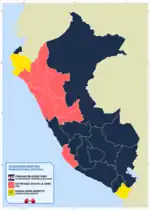| |||||||||||||||||||||||
|
| |||||||||||||||||||||||
Presidential election | |||||||||||||||||||||||
| |||||||||||||||||||||||
 | |||||||||||||||||||||||
| |||||||||||||||||||||||
 |
|---|
|
|
General elections were held in Peru on 9 June 1963 to elect the President and both houses of the Congress after the results of the 1962 elections were annulled following a military coup.[1] The Peruvian Armed Forces, who controlled the nation as a military junta following the coup, largely controlled the electoral process to prevent the election of Víctor Raúl Haya de la Torre.[2] Supported by Popular Action and the Christian Democrat Party, Fernando Belaúnde Terry won the presidential election with 39% of the vote, whilst the American Popular Revolutionary Alliance emerged as the largest party in both houses of Congress.
Following a coup on 3 October 1968, no further elections were held until a Constituent Assembly was elected in 1978.[1]
Results
President
| Candidate | Party | Votes | % | |
|---|---|---|---|---|
| Fernando Belaúnde Terry | Popular Action–Christian Democrat Party | 708,662 | 39.05 | |
| Víctor Raúl Haya de la Torre | American Popular Revolutionary Alliance | 623,501 | 34.36 | |
| Manuel A. Odría | Odriist National Union | 463,085 | 25.52 | |
| Mario Samamé Boggio | Popular Union | 19,320 | 1.06 | |
| Total | 1,814,568 | 100.00 | ||
| Valid votes | 1,814,568 | 92.85 | ||
| Invalid/blank votes | 139,716 | 7.15 | ||
| Total votes | 1,954,284 | 100.00 | ||
| Registered voters/turnout | 2,070,718 | 94.38 | ||
| Source: Nohlen | ||||
Senate
| Party | Seats | |
|---|---|---|
| American Popular Revolutionary Alliance | 18 | |
| Popular Action | 15 | |
| Odriist National Union | 7 | |
| Christian Democrat Party | 5 | |
| Total | 45 | |
| Source: Nohlen | ||
Chamber of Deputies
| Party | Seats | |
|---|---|---|
| American Popular Revolutionary Alliance | 56 | |
| Popular Action | 39 | |
| Odriist National Union | 26 | |
| Christian Democrat Party | 10 | |
| United Left | 3 | |
| Peruvian Democratic Movement | 2 | |
| Independents | 3 | |
| Total | 139 | |
| Source: Nohlen | ||
Reactions
Eight countries in the South America and the United States condemned the elections, saying that the Peruvian Armed Forces interfered with the process.[2] After conciliatory measures by the military junta, the United States would recognize the armed forces as the government.[2]
Deputies
References
- 1 2 Dieter Nohlen (2005) Elections in the Americas: A data handbook, Volume II, p454 ISBN 978-0-19-928358-3
- 1 2 3 "Peru". The Atlantic. 1962-11-01. Retrieved 2023-05-04.

